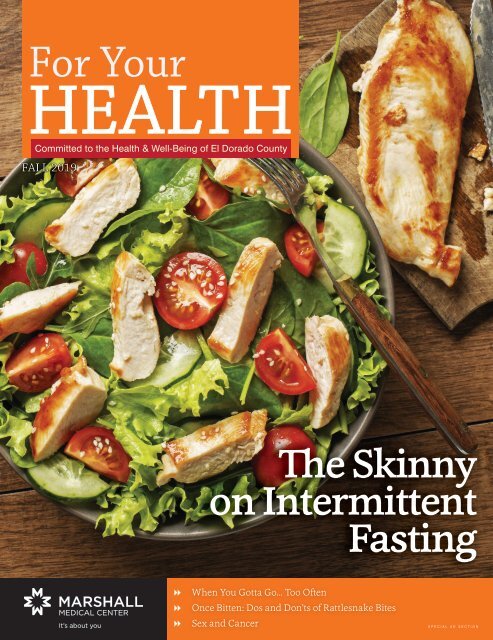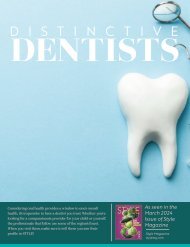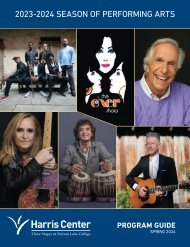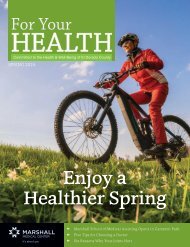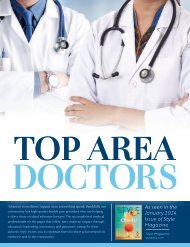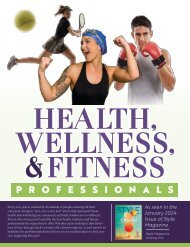Marshall For Your Health, September 2019
For Your Health is intended to provide information about health in general as well as healthcare services and resources available in El Dorado County. Information comes from a wide range of medical experts. If you have any concerns or questions about specific content that may affect your health, please contact your healthcare provider.
For Your Health is intended to provide information about health in general as well as healthcare services and resources available in El Dorado County. Information comes from a wide range of medical experts. If you have any concerns or questions about specific content that may affect your health, please contact your healthcare provider.
Create successful ePaper yourself
Turn your PDF publications into a flip-book with our unique Google optimized e-Paper software.
Committed to the <strong>Health</strong> & Well-Being of El Dorado County<br />
FALL <strong>2019</strong><br />
The Skinny<br />
on Intermittent<br />
Fasting<br />
<br />
<br />
<br />
When You Gotta Go... Too Often<br />
Once Bitten: Dos and Don’ts of Rattlesnake Bites<br />
Sex and Cancer<br />
SPECIAL AD SECTION
SPECIAL AD SECTION<br />
DID YOU KNOW<br />
Welcome Siri Nelson,<br />
<strong>Marshall</strong>’s New CEO<br />
<strong>Marshall</strong> Medical<br />
Center<br />
welcomes<br />
Siri Nelson,<br />
MHA, FACHE,<br />
CPA, as its new Chief<br />
Executive Officer. Siri joined<br />
the organization in July and will<br />
spend six months transitioning<br />
responsibilities from the<br />
outgoing CEO James Whipple.<br />
Upon James’ retirement in<br />
January, Siri will officially step<br />
into the role.<br />
Siri is a native Californian whose<br />
most recent position was as<br />
CEO at Renown <strong>Health</strong>’s South<br />
Meadows Medical Center<br />
in Reno, Nevada. “Siri is a<br />
seasoned healthcare executive,<br />
one the board found to be a<br />
great fit, given her 28 years<br />
of experience in rural health,”<br />
says Gabrielle Marchini, chair of<br />
the <strong>Marshall</strong> Hospital Board of<br />
Directors.<br />
Siri began her career in<br />
accounting and finance, doing<br />
audits of various health care<br />
organizations. “I just fell in<br />
love with the complexity of the<br />
organizations,” she says. That’s<br />
how she got into health care<br />
Ask Siri<br />
Q: What do you do for fun?<br />
I love to read and I like to garden. I take<br />
walks and I’m trying to get back into<br />
running. I’ve done three half marathons. I love to hang out<br />
with my friends and shop, lunch, and hike. I also took up<br />
horseback riding recently.<br />
Q: What are three books we would find on your shelf?<br />
• The Art of Dying Well by Katy Butler<br />
• Little Fires Everywhere by Celeste Ng<br />
• The Year of Yes by Shonda Rhymes<br />
Q: What’s your favorite vacation spot?<br />
I love vacationing near the ocean and spending time at the<br />
beach. I enjoy hiking in the mountains and the desert.<br />
administration and began working at several community hospitals in the Sierra Foothills and the<br />
Central Valley. She served as Chief Financial Officer and Interim CEO at Sutter Amador Hospital<br />
in Jackson, Chief Administrative Officer at Sutter Lakeside in Lakeport and since 2017, as Chief<br />
Executive Officer at South Meadows Medical Center in Reno. She now also chairs the American<br />
Hospital Association’s section for Small & Rural Hospitals.<br />
“I can already tell <strong>Marshall</strong> is a really good organization,” says Siri. “The people care about this<br />
community, they care about each other and they care about their patients. People are very committed.<br />
One of the things that drew me here was that connection to purpose and patient-centered focus. That<br />
is a great foundation. What I’m hoping to do is to take <strong>Marshall</strong> to the next level, a focus on world class<br />
care, patient engagement and employee engagement. <strong>Marshall</strong> is already on that path, we just need<br />
to leverage that momentum to keep things moving in the right direction.”<br />
ABOUT MARSHALL<br />
MEDICAL CENTER<br />
<strong>Marshall</strong> Medical Center<br />
is an independent,<br />
nonprofit community<br />
healthcare provider located in<br />
the heart of the Sierra Foothills<br />
between Sacramento and<br />
South Lake Tahoe. <strong>Marshall</strong><br />
Medical Center includes<br />
<strong>Marshall</strong> Hospital, a fully<br />
accredited acute care facility<br />
with 125 beds located in<br />
Placerville; several outpatient<br />
facilities in Cameron Park,<br />
El Dorado Hills, Placerville<br />
and Georgetown; and many<br />
community health and<br />
education programs. <strong>Marshall</strong><br />
has nearly 300 physicians<br />
and a team of over 1,600<br />
employees providing quality<br />
healthcare services to over<br />
175,000 residents of El<br />
Dorado County.<br />
<strong>For</strong> <strong>Your</strong> HEALTH<br />
is published as a community<br />
service by<br />
MARSHALL MEDICAL CENTER<br />
1100 <strong>Marshall</strong> Way<br />
Placerville, CA 95667<br />
telephone 530-622-1441<br />
or 916-933-2273;<br />
www.marshallmedical.org<br />
It is intended to provide<br />
information about health in<br />
general as well as healthcare<br />
services and resources available<br />
in El Dorado County. Information<br />
comes from a wide range of<br />
medical experts. If you have any<br />
concerns or questions about<br />
specific content that may affect<br />
your health, please contact your<br />
healthcare provider.<br />
To reach the editor of <strong>For</strong> <strong>Your</strong><br />
<strong>Health</strong>, contact Brittany Garcia<br />
at 530-626-2816 or<br />
bgarcia@marshallmedical.org<br />
2 | FOR YOUR HEALTH | www.marshallmedical.org
BETTER CARE FOR YOU<br />
When You Gotta Go…<br />
Too Often<br />
Urinary incontinence is as inconvenient as it is<br />
embarrassing. Quite common in both men and women,<br />
the severity can range. While coughing, laughing and<br />
sneezing may cause some to leak urine, others may get a strong<br />
and sudden urge that cause a total loss of<br />
control.<br />
There are several ways to address this<br />
issue, including fluid management,<br />
physical therapy, and medication. But<br />
if none of these methods provide relief,<br />
the use of Botox® on the bladder is<br />
another solution. “Botox works by<br />
blocking the signals from the nerves<br />
to the muscles, calming the overactive<br />
bladder,” says John V. Monterello, MD,<br />
of <strong>Marshall</strong> Urology. “A calm bladder is<br />
a happier bladder, helping you enjoy<br />
everyday activities without constantly<br />
Once Bitten: Dos and Don’ts<br />
of Rattlesnake Bites<br />
Summer and fall are rattlesnake season<br />
in Northern California. Though their<br />
bites are rarely fatal, rattlesnakes are<br />
dangerous and their attack can cause<br />
a serious medical emergency. If you<br />
get bitten, call 911 and seek treatment<br />
immediately.<br />
The most obvious symptom of a<br />
rattlesnake bite is the puncture marks<br />
made by their large fangs, where you<br />
may experience pain, tingling or burning.<br />
Other symptoms include:<br />
• numbness in the face or limbs<br />
• lightheadedness<br />
• weakness<br />
• nausea or vomiting<br />
• sweating<br />
• salivating<br />
• blurred vision<br />
• difficulty breathing<br />
Once bitten, the first thing to do is get<br />
away from the snake as quickly as<br />
possible to avoid a second bite. Don’t try<br />
to catch the snake but make a note of<br />
its size and color. This will help medical<br />
professionals identify which species it is.<br />
Seek medical assistance as soon as<br />
possible; calling an ambulance is a good<br />
idea. While you wait, stay calm, don’t<br />
raise the bitten area above the level of<br />
your heart, stay as still as possible and<br />
remove any tight clothing or jewelry as<br />
you may start to swell. Don’t wash the<br />
wound, but place a clean bandage on it.<br />
Don’t ice nor apply a tourniquet -- letting<br />
the wound bleed will expel some of<br />
the venom. You may have seen this on<br />
TV, but don’t suck the venom with your<br />
mouth as you are not only exposing<br />
the venom to your mouth but also<br />
wondering where the nearest restrooms are.”<br />
It takes about 30 minutes to administer injections throughout<br />
the bladder using a small lighted tube called a cystoscope<br />
inserted through the urethra. Results can<br />
last anywhere from four to 10 months<br />
and can be repeated when the effects start<br />
to wane. Men with prostate problems are<br />
not considered good candidates for this<br />
treatment.<br />
The procedure is covered by most<br />
insurance, including Medicare.<br />
Talk to your doctor to see if bladder Botox<br />
could be right for you.<br />
<strong>For</strong> more information, call <strong>Marshall</strong><br />
Urology at 530-676-6131<br />
introducing bacteria to the wound.<br />
Once you’ve been treated in the<br />
emergency room, you’ll likely be<br />
prescribed pain medication, Benadryll<br />
and an antibiotic. Be sure to make a<br />
follow up appointment with your primary<br />
care provider to ensure the wound is<br />
healing properly.<br />
Northern California has beautiful terrain.<br />
Don’t let rattlesnakes stop you from<br />
venturing outdoors. With proper gear<br />
like boots and other protective gear,<br />
awareness of your surroundings and<br />
some knowledge about these reptiles,<br />
you can continue to enjoy nature.<br />
<strong>For</strong> more information about <strong>Marshall</strong> Medical Center, visit www.marshallmedical.org or follow us on<br />
Facebook/marshallmedicalcenter, twitter.com/<strong>Marshall</strong>Medical, on YouTube, LinkedIn and on Instagram<br />
SPECIAL AD SECTION<br />
www.marshallmedical.org | FOR YOUR HEALTH | 3
COVER STORY<br />
The Skinny on<br />
Intermittent<br />
Fasting<br />
SPECIAL AD SECTION<br />
Intermittent fasting: you’ve probably heard about it.<br />
You likely know someone trying it out for weight loss.<br />
It’s gained much popularity recently, although fasting<br />
has been used by different cultures for centuries.<br />
What is it?<br />
Intermittent fasting is cycling periods of eating<br />
and not eating. Studies show that by doing this,<br />
people eat fewer calories than on other calorie<br />
restrictive diets. “During the fasting state, your blood sugar<br />
and insulin levels are lower, allowing your body to burn<br />
more fat,” explains Tarandeep Kaur, MD, of <strong>Marshall</strong> Family<br />
Medicine in El Dorado Hills. In her practice, Dr. Kaur has a<br />
special interest in medical weight management.<br />
The basics of intermittent fasting involve eating for a certain<br />
amount of time, followed by a period of fasting. While we’re<br />
fasting, our bodies go through a process called autophagy<br />
in which our system clean house by discarding old cells and<br />
building new ones. Feeding yourself more often throughout<br />
the day inhibits this process and slows weight loss.<br />
The two most popular schedules are:<br />
• Eating normally for five days a week and eating only 500<br />
calories for the other two days<br />
• Eating normally for eight hours and abstaining from food<br />
or drinks that contain calories for 16 hours. A more extreme<br />
version of this is eating for four hours and fasting for 20.<br />
The most important thing to note for either of these<br />
schedules is to maintain healthy eating habits during your<br />
eating period—whole grains, moderate protein, fruits,<br />
vegetables and healthy fats. Dr. Kaur recommends eating<br />
25-30% of your daily protein for your first meal, along with<br />
plenty of fiber. She also suggests eating a lighter dinner to<br />
help speed weight loss.<br />
4 | FOR YOUR HEALTH | www.marshallmedical.org
Intermittent<br />
fasting is cycling<br />
periods of<br />
eating and not<br />
eating.<br />
exercise schedule,” says Kari Holmstedt, RD, a registered<br />
dietician at <strong>Marshall</strong> Diabetes and Nutrition Education,<br />
“although if you find your workouts to be more effective<br />
before or after eating, take that into account when you<br />
determine what hours or days you eat and fast.”<br />
What are the benefits?<br />
Intermittent fasting is shown to have just as positive results,<br />
if not more so, than other calorie restrictive diet programs.<br />
Following this program will not slow down your metabolism<br />
so resulting weight loss is very sustainable in the long term.<br />
It also helps you lose more fat than muscle and even lowers<br />
inflammation.<br />
Preparing for Intermittent Fasting<br />
“Before starting an intermittent fasting program,” says Dr.<br />
Kaur, “change your eating habits to include three meals a day<br />
without snacking.” This will help your body prepare for long<br />
periods without caloric intake. Talk to your doctor before<br />
starting this program if you have any of the following risk<br />
factors:<br />
• If you’re younger than 18 years old<br />
• If you’re pregnant, nursing or trying to become pregnant<br />
• If you have a history of disordered eating<br />
• If you have diabetes or hypertension.<br />
If you have been prescribed medications that should be<br />
taken with food, be sure to adjust your medication schedule<br />
to fit your fasting schedule. As for your exercise routine,<br />
“intermittent fasting shouldn’t have an impact on your<br />
Studies also show benefits for people with diabetes. Just a five<br />
to 10 percent weight loss has been shown to improve diabetes<br />
symptoms by 58% and lowers A1C results. “Some studies<br />
indicate fasting helps with mental alertness and may prevent<br />
Alzheimer’s and dementia,” says Kari. Another benefit to this<br />
method is that it’s easier to follow than counting calories,<br />
carbs, or points.<br />
Intermittent fasting also increases growth hormone levels<br />
during the fasting state, so this program is beneficial for<br />
people trying to gain muscle.<br />
Best of all, unlike other popular weight loss programs that require<br />
the purchase of special, branded foods and workout videos, there<br />
is no added cost associated with intermittent fasting.<br />
To make an appointment with Dr. Kaur, call 530-344-5400.<br />
To consult with a registered <strong>Marshall</strong> Diabetes & Nutrition<br />
Education dietician, call 530-672-7021.<br />
SPECIAL AD SECTION<br />
www.marshallmedical.org | FOR YOUR HEALTH | 5
FOUNDATION NEWS<br />
Grant Funds Screenings for Children<br />
The <strong>Marshall</strong><br />
Foundation for<br />
Community <strong>Health</strong><br />
recently granted the<br />
El Dorado County<br />
Office of Education –<br />
Child Development Programs $14,300.<br />
The grant will provide preventive<br />
screenings to between 300 - 500 El<br />
Dorado County children to detect early<br />
signs of hearing and vision loss. With<br />
grant funds, a new Vision Screener<br />
and a new Hearing Screener were<br />
purchased to replace the outdated<br />
machines.<br />
Approximately 15-20% of students<br />
screened will be referred to a physician<br />
or specialist for follow up based<br />
on results of the screenings. The<br />
opportunity to detect student health<br />
inconsistencies provides families<br />
health care resources they need<br />
during student’s early development.<br />
Early detection also gives low<br />
income families that live in rural<br />
areas resources provided at school;<br />
eliminating transportation and<br />
logistics during the school day.<br />
Both vision and hearing screening are<br />
required within the first 45 days of<br />
Head Start enrollment. The grant also<br />
purchases a Pulse CO-Oximeter that<br />
screens for hemoglobin, which can<br />
eliminate multiple trips to a physician.<br />
Finally, the grant helps with an<br />
Audiometric educational course for the<br />
School Audiometrist that provides upto-date<br />
education on student hearing.<br />
Swing for <strong>Health</strong><br />
The Foundation’s<br />
grant provides<br />
a proactive and<br />
evidence-based<br />
opportunity to serve<br />
our community’s<br />
children and<br />
families. The<br />
preventive<br />
screenings improve<br />
our children’s<br />
education,<br />
educators’ ability to<br />
teach, and families’ financial burdens<br />
and long term health care costs.<br />
The <strong>Marshall</strong> Foundation for<br />
Community <strong>Health</strong> is proud to support<br />
and partner with EDCOE to improve<br />
our community healthcare.<br />
The 36th Annual Bob West Drive<br />
for <strong>Marshall</strong> Golf Tournament<br />
was held on June 21 under a sunny,<br />
but cool sky at Placervile’s Cold<br />
Spring Country Club. The tournament<br />
netted the largest amount in 36 years<br />
of over $67,000 with 128 golfers<br />
participating. Monies from the golf<br />
tournament go toward improving<br />
healthcare through <strong>Marshall</strong> Medical<br />
Center and our community.<br />
Winners in Gross Flight were Kevin<br />
Earl, Chris Bailey, Tom Hazlett and<br />
Jeff Rusert; Callaway Flight, Mike<br />
Murphy, Dave Ramirez, John Gardner,<br />
Rob Dinunzio.<br />
SPECIAL AD SECTION<br />
Thank you to all our participants,<br />
sponsors, volunteers and the golf<br />
committee. Special thanks to Union<br />
Bank and the Winn Foundation who<br />
were our Executive and Masters<br />
Sponsors.<br />
<strong>For</strong> more information about <strong>Marshall</strong> Foundation for Community <strong>Health</strong>, its<br />
programs and giving opportunities, visit marshallfound.org.<br />
6 | FOR YOUR HEALTH | www.marshallmedical.org
FEATURE<br />
GET BACK<br />
IN MOTION<br />
Back on track<br />
Sex and<br />
Cancer<br />
Back on the job<br />
“<br />
Sex” and “cancer” are two provocative words. Now throw<br />
in “vaccination” and “teens.” These are not random words<br />
mentioned just to get your attention. The correlation is the<br />
HPV vaccine that prevents most cervical and genital cancers<br />
transmitted by sex. The window for the vaccine is before<br />
sexual activity begins—in the pre-teen years—as early as 9<br />
years old.<br />
“As a parent, it’s hard to fathom making the decision to<br />
vaccinate your child against a sexually transmitted virus. We<br />
want to avoid the subject, banish the thought, bury our heads<br />
in the sand,” says <strong>Marshall</strong> Pediatrician Brett Christiansen,<br />
MD. “But the facts of life are undeniable. The fact that there is<br />
a way to safely and effectively vaccinate boys and girls against<br />
cancers caused by the human papillomavirus, or HPV,<br />
shouldn’t be ignored.”<br />
HPV is a very common virus passed through skin-to-skin<br />
contact during sexual activity. It’s so common that most<br />
sexually active people will get HPV during their lifetime. HPV<br />
causes over 18,000 head and neck cancers and nearly 12,000<br />
cervical cancers each year in the US.<br />
The HPV vaccine reduces the risk of developing HPV type<br />
cancers by 90%. It’s important to get children immunized<br />
before they become sexually active. The ideal window is to<br />
immunize girls and boys around age 11 or 12 with a series<br />
of doses. The vaccine can still be effective for young adults<br />
through age 26 though it is most effective when given at<br />
younger ages. The HPV vaccine is covered by most insurance.<br />
Speak with your doctor or make an appointment with<br />
<strong>Marshall</strong> Pediatrics at 530-626-1144.<br />
Back to activities<br />
you love<br />
From foot and ankle surgeries,<br />
rotator cuff and meniscal repairs, to<br />
joint replacement and regenerative<br />
medicine, trust the experts at <strong>Marshall</strong><br />
Orthopedics to get you back in motion.<br />
4300 Golden Center Drive, Suite C | Placerville<br />
530-344-2070<br />
5137 Golden Foothill Pkwy, #120 | El Dorado Hills<br />
916-805-2320<br />
www.marshallmedical.org/ortho<br />
SPECIAL AD SECTION<br />
www.marshallmedical.org | FOR YOUR HEALTH | 7
OTHER NEWS<br />
Community <strong>Health</strong><br />
Library<br />
<strong>Marshall</strong> Medical Center’s<br />
Community <strong>Health</strong> Library in<br />
Cameron Park is home to over<br />
5,000 resources including books,<br />
DVDs, CDs and medical journals<br />
free to borrow. The staff of<br />
librarians also conducts medical<br />
research at no charge.<br />
Topics include:<br />
• Prevention and wellness<br />
• Nutrition, diets, cookbooks,<br />
fitness<br />
• Pregnancy and childbirth<br />
• Mental health, substance<br />
abuse, stress management<br />
• Women, men and children’s<br />
health<br />
• <strong>Health</strong>y aging and care giving<br />
• Complementary therapies<br />
• Diseases and procedures<br />
• Children’s books, DVDs and<br />
CDs<br />
Know the Risks of<br />
Head and Neck Cancer<br />
Open Monday through Thursday,<br />
from 9 a.m. to 4 p.m., the library is<br />
located at 3581 Palmer Drive, Suite<br />
101, Cameron Park. Come visit for<br />
a quiet place to study or conduct<br />
your own research.<br />
SPECIAL AD SECTION<br />
If you smoke, drink alcohol or are<br />
sexually active, you may be at<br />
risk for cancer. A free, 10-minute<br />
screening could save your life.<br />
This year, there will be 65,000<br />
new cases and 14,000 deaths<br />
from oral, head and neck cancer<br />
or cancers that arise in the oral<br />
cavity (mouth), larynx (voicebox), pharynx<br />
(throat), sinuses, nasal cavity or salivary<br />
glands.<br />
Alcohol and tobacco use (including<br />
smokeless tobacco) are the two most<br />
important risk factors for head and neck<br />
cancers, especially for cancers of the oral<br />
cavity and throat. Alcohol and tobacco<br />
use accounts for at least 75 percent of<br />
these cancers and the risk increases for<br />
those who use both. Infection with human<br />
papillomavirus (HPV) contracted through<br />
sexual contact is also a risk factor for<br />
some types of head and neck cancers.<br />
Other risk factors include:<br />
• Consumption of certain preserved or<br />
salted foods during childhood<br />
• Poor oral hygiene and missing teeth<br />
• Occupational exposure to wood dust,<br />
asbestos and synthetic fibers<br />
• Radiation exposure<br />
• Epstein-Barr virus infection<br />
• Asian, particularly Chinese, ancestry<br />
Symptoms of head and neck cancers<br />
may include a lump or a sore that won’t<br />
heal, a persistent sore throat, difficulty<br />
swallowing, and a change or hoarseness<br />
in the voice. Since these are symptoms<br />
that are also associated with other<br />
conditions, a specific head and neck<br />
cancer screening is very important.<br />
FREE HEAD AND NECK<br />
CANCER SCREENING<br />
Join <strong>Marshall</strong> Cancer Center for a<br />
free, 10-minute screening for adults:<br />
Wednesday, October 16<br />
9 a.m. to 1 p.m.<br />
Cold Springs Dental<br />
2900 Cold Springs Road<br />
Placerville, CA<br />
<strong>For</strong> more information call<br />
530-672-7050 or visit<br />
marshallmedical.org/<br />
cancerscreening.<br />
8 | FOR YOUR HEALTH | www.marshallmedical.org


